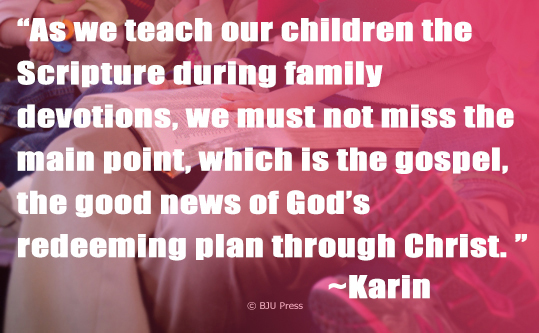
The most important pattern we can establish in our families is a consistent Bible time together. From the time our children can communicate until they leave home, we must be continually teaching them God’s Word. Deuteronomy 6:6–7 exhorts, “And these words . . . shall be in thine heart: and thou shalt teach them diligently unto thy children, and shalt talk of them when thou sittest in thine house, and when thou walkest by the way, and when thou liest down, and when thou risest up.” All throughout the day we should be bringing up Bible conversations with our children. Every opportunity we have, we are to point them to Christ. But it’s important to schedule a specific time during the day to put aside everything else and gather as a family to study God’s Word and pray together.
Why Family Bible Time
It’s a time to learn more about our great God! It’s a time to teach our children how to effectively study God’s Word. It’s a time to share close fellowship in the Bible and prayer. Maintaining this mindset will help keep us from viewing devotions as a chore or duty. If we are passionate about God’s Word, it will encourage our children to get excited about it as well.
When and Where
Try to have your family devotions at the same time and place every day. We like to have our family devotions in the evening, just before bedtime. Usually it takes place in our daughters’ bedroom on one of their beds. Perhaps mornings or afternoons work better for your family. Whenever it is, try to have everything done and put away before devotions so no one will be distracted.
What to Read
Scripture itself is always the best choice! Choose a book of the Bible to read through, such as one of the Gospels or the book of Proverbs. Depending on your children’s ages, you can read just a few verses or an entire chapter. Recently our family started reading through the book of Psalms.
How to Get Everyone Involved in Bible Time
Every family member should be engaged during family devotions. One way our girls participate is by taking turns reading Bible verses aloud. If your children are too young to read, you can involve them by asking them simple questions about some of the verses you read. After reading a psalm, my husband asks our daughters specific questions about what we just read. For example, from Psalm 1 he asked questions like these:
“What does the word blessed mean?”
“How do we delight in the law of the Lord?”
“What does it mean to meditate?”
“Why does God compare the righteous person to a tree?”
After discussing the passage, we sing some songs together. We quote a memory verse and then close with prayer. We like to use “prayer sticks”—craft sticks with names of loved ones, missionaries, and church members written on them. We keep them in a jar and each of us draws one prayer stick and prays for that person or family.
Let’s make family Bible time the most special part of our day!
• • • • •
Jennifer is a pastor’s wife and mom of two young girls and loves homeschooling them. During her own twelve years of being homeschooled, Jennifer developed a passion for reading and writing. She earned a bachelor’s degree in creative writing and relishes writing during her free time.



